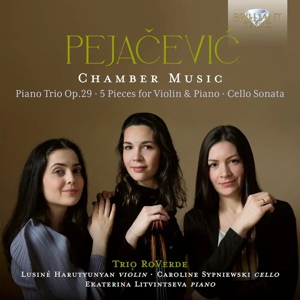
Dora Pejačević (1885-1923)
Cello Sonata in E minor, Op.35 (1913)
Five Pieces for violin and piano (1899-1919)
Piano Trio, Op.29 (1910)
Trio RoVerde
rec. 2023, Suk Hall, House of Music, Pardubice, Czechia
Brilliant Classics 97020 [79]
New recordings continue to emerge of the music of the short-lived Croatian aristocrat Dora Pejačević. You won’t find it difficult to locate her Symphony, Piano Concerto and other works – indeed they’ve been reviewed here. Both the Cello Sonata and the Piano Trio were recorded over fifteen years ago on CPO (review), the label that has been preeminent in her reclamation on disc, by the team of Andrej Bielow, Christian Poltéra and Oliver Triendl. Now here’s another.
The Piano Trio, Op.29 was composed in 1910, the same year in which she wrote the first Piano Concerto by a Croatian. The Trio is suffused with late-Romantic and mellifluous elegance. It’s elegantly laid out for all three instruments, cast in classic sonata form, and sports a knowingly crisp Scherzo with a fine contrasting B section. The slow movement opens sombrely but soon generates athletic dynamism into an Allegretto section, echoing Mendelssohn’s Trios, one feels.
The Cello Sonata followed three years later; another four-movement work laid out with exemplary precision. There is a great deal of languorous cantabile richness in this work, as well as a pert Scherzo before the flowing solemnity and eloquence of the Adagio. The finale is bathed in confidence and lashings of lyricism, once again.
These are expert works but what they lack is a sense of definable personality and character. Her early death, as a result of kidney failure, the consequence of childbirth two months earlier, at the age of thirty-eight was a great loss. The intervention of the War, during which she served as a field nurse, would also have cost her time and sapped her of energy to compose.
There are five violin vignettes included in this disc, composed between 1899 – when she was 14 – and 1919. The earliest was dedicated to Stefi Geyer, of Bartók fame, conventional and serious, the second to Jaroslav Kocian, a piece of Kreislerian baroquerie, and there’s a sweetly lyric Romance without dedication; sweetly lyric seems to have been a frequent default compositional position. The Elegy of 1913 is aptly darker and melancholic, and the final Meditation was dedicated, interestingly, to Vitězslav Novák, in 1919. This was at the time of Czech independence when Novák was establishing the administration of the newly Czech-only Conservatoire in Prague so possibly Pejačević was acknowledging this. The notes, which are fine and well written, don’t touch on this point.
The recording in the Suk Hall, House of Music, Pardubice has been well-balanced. Trio RoVerde is itself a finely-balanced trio and ensure that Pejačević’s lyrism and structural strengths are respected.
Jonathan Woolf
Help us financially by purchasing from




















